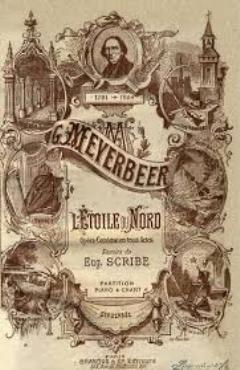Meyerbeer - L'Etoile du Nord (London, 1975)
Meyerbeer - L'Etoile du Nord (London, 1975)

Danilowitz - Alexander Oliver Peter the Great - Malcolm King Georges - Bonaventura Bottone Catherine - Janet Price Prascovia - Deborah Cook Gritzenko - Alan Watt Ismailoff - Graham Clark Reynolds - Roger Bryson Nathalie - Lissa Gray Ekimova - Susanna Ross Yermoloff - Bruce Ogston New Symphony Orchestra Roderick Brydon - conductor Collegiate Theatre, London - (25/02/1975)
L'Etoile du Nord is one of Meyerbeer's two "opera comiques", the other being Dinorah. The work has had two "revivals" in receent years--one by Opera rara in 1975, and the other at Wexford in 1996. The first is rather significantly cut, while the second has been described as being "note complete". Alas, that is not the case. What I would consider as one of the most striking pieces of music in the Opera Rara version, the triple march in the finale to the second act, has been torn to shreds at Wexford. In the original version, there is a rebellion against the Tsar, which he deflects as the "sacred march" is heard. The troops are then joined by a regiment of greandiers from Tobolsk, to the music of a different march, followed by a regiment of Tatar cavalry to the music of a third march. The effect is stupendous. But the omission of the last two marches at Wexford turn this finale into a routine affair. While it is true that Wexford reinstated quite a few other number, I do not regard these as making up for the truncated march.
The rest of the music of Etoile du Nord is strikingly charming. The best two numbers of the score are, of course, the air and barcarolle for Catherine in Act I, and the air with two flutes for her at the end. But the other characters also have a considerable amount of fine music. Typically of French opera, this also holds for many of the secondary roles.
As for the performance, I would prefer the old Opera Rara LP. Both prima donnas--Elizabeth Futral and Janet Price are fine, and a pleasure to listen to. But Malcolm King (Peter the Great) in the Opera Rara is considerably better than Vladimir Ognev, while MRF also has the better Danilowitz and, with one exception, better singers for the lesser roles. The exception is the George, luxurious casting at Wexford for such a small role in the person of the new Peruvian tenor sensation, Juan Diego Flórez. --- oocities.org
Another opera by Meyerbeer, but one which has disappeared from the repertoire of the lyric stage, is "L'Etoile du Nord."
"L’Etoile du Nord" has a famous air -- a high soprano solo with obligato for two flutes, which was one of Jenny Lind’s greatest show-pieces, but has not sufficed to keep the opera alive.
The score of "L’Etoile du Nord," produced at the Opéra Comique, Paris, February 16, 1854, was assembled from an earlier work, "Das Feldlager in Schlesien" (The Camp in Silesia), produced for the opening of the Berlin Opera House, February 17, 1847; but the plots differ. The story of "L’Etoile du Nord" relates to the love of Peter the Great for Catherine, a cantiniere. Their union finally takes place, but not until Catherine has disguised herself as a soldier and served in the Russian camp. After surreptitiously watching Peter and a companion drink and roister in the former’s tent with a couple of girls, she loses her reason. When it is happily restored by Peter playing familiar airs to her on his flute, she voices her joy in the show-piece, "La, la, la, air chéri" (La, la, la, beloved song), to which reference already has been made. In the first act Catherine has a "Ronde bohémienne" (Gypsy Rondo), the theme of which Meyerbeer took from his opera "Emma de Rohsburg."
"L’Etoile du Nord" is in three act. There is much military music in the second act -- a cavalry chorus, "Beau cavalier au Coeur d’acier" (Brave cavalier with heart of steel); a grenadier song with chorus, "Grenadiers, fiers Moscovites" (grenadiers, proud Muscovites), in which the chorus articulates the beat of the drums ("tr-r-r-um"); the "Dessauer" march, a cavalry fanfare "Ah! Voyez nos Tartares du Don" (Ah, behold our Cossacks of the Don); and a grenadiers’ march: stirring numbers, all of them.
The libretto is by Scribe. The first act scene is laid in Wyborg, on the Gulf of Finland; the second in a Russian camp; the third in Peter’s palace in Petrograd. Time, about 1700. --- musicwithease.com
download (mp3 @320 kbs):
uploaded yandex 4shared mega mediafire zalivalka cloudmailru oboom uplea








